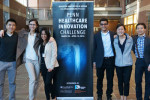
At the Mack Institute’s Fall Conference 2016, leaders from across industries discussed their companies’ pursuit of “connected strategy” defined by continuous customer engagement.…Read More

At the Mack Institute’s Fall Conference 2016, leaders from across industries discussed their companies’ pursuit of “connected strategy” defined by continuous customer engagement.…Read More

CIP student Emily Pell talks about what she learned working on healthcare innovation in sexual wellness – and how she snagged an internship in the process.…Read More

By learning to effectively manage a diverse organizational ecosystem, the NGO North Star Alliance is driving health care innovation in sub-Saharan Africa. Mack Institute researcher Aline Gatignon interviews its former executive director about getting organizational culture right.…Read More

Digital disruption is driving transformation across entire industries. Our Spring Conference 2016 examined how healthcare, transportation, and retail are adapting.…Read More

Over the course of a three-week sprint this spring, students at Penn worked to reinvent the pre-operative process for hip and joint replacement surgeries. The 2016 Penn Healthcare Innovation Challenge invited cross-campus teams to find new ways to help patients better navigate this complex process.…Read More

It’s one of the paradoxes of being human: even when we know what’s good for us, we often make choices that are less than optimal. Wharton Professor Iwan Barankay researches how incentives can be used to create positive behavioral changes even after the incentive goes away.…Read More

Politicians love to blame greedy Big Pharma for our country’s rapidly ballooning health care costs. But Senior Fellow Mike Mandel argues that curtailing the cost of medical labor will have the biggest impact on reducing healthcare spending.…Read More

Wharton MBA student Mariam Malik has long had an interest in mental health care. Through the Mack Institute Student Research Fellowship, she crafted a business plan to help service providers deliver improved care through greater coordination.…Read More

MBA Research Fellow Neil Assur tackled the nebulous challenge of finding new opportunities for business innovation in the nutrition space. Here’s what he learned about entrepreneurship and the unexpected places it can lead.…Read More

Hospitals and academic medical centers are hiring chief innovation officers to transform the way they deliver care. But what makes an effective CIO in this industry?…Read More

This research project examines how organizations can develop innovative solutions to large-scale socio-economic problems in emerging markets through multi-stakeholder partnerships. The objective is to determine how these partnerships are built, what the optimal configuration of partners is, and how the partnerships should be coordinated.…Read More

The burden of oral disease in the U.S. is high, and in need of novel approaches to improving preventive oral health behaviors. Almost half of U.S. adults have periodontal disease, while 92% of adults and 50% of children experience dental caries. The Affordable Care Act (ACA) put new emphasis on financial incentives in which financial rewards for patients and providers are linked to health decisions and outcomes.…Read More

Executives from the new company Avia explain how their innovation cohort model helps struggling health systems while creating new marketplaces for entrepreneurs.…Read More

Hospitals are increasingly facing market and regulatory pressures and the need to innovate is becoming ever more salient. One response has been the creation of the role of Chief Innovation Officer, or CIO.…Read More

Co-director Christian Terwiesch and his colleagues make the case that when it comes to innovation in healthcare, importing solutions from other industries should take a backseat to “insourcing,” seeking insight from clinicians within the healthcare system itself.…Read More

Over the last five years, rapid innovations in mobile technology have resulted in the explosive adoption of smartphones and tablets (and applications built for them) that not only allow users to access an endless amount of information, but that can collect a wide variety of real-time user data, regardless of location. The implications of this within the health industry are vast.…Read More

Abstract: We use panel data from multiple wards from two hospitals spanning a three-year period to investigate the impact of automation of the core error prevention functions in hospitals on medical error rates. Although there are studies based on anecdotal evidence and self-reported data on how automation impacts medical errors, no systematic studies exist that are based on actual error rates from hospitals.…Read More

Radiation therapy has been used to treat human disease for more than 100 years. Currently, radiation therapy is a mainstay of cancer therapy, used to treat approximately 1 million patients per year in the United States. Radiation works by causing damage to cellular DNA. It is particularly useful in treating cancer because neoplastic cells, which lack many normal DNA repair capabilities, making them more susceptible to radiation-induced DNA damage than healthy cells.…Read More